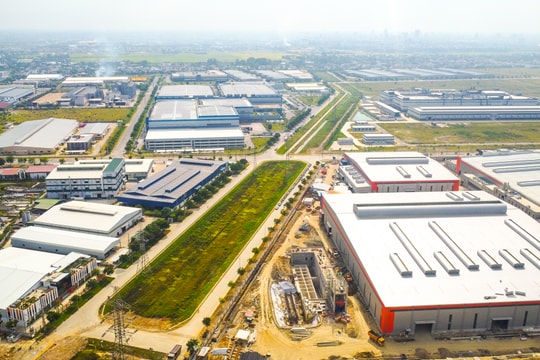Savills: Vietnam should abolish land price framework
According to Savill, the method of determining market value should be regulated as the basis for all transactions instead of using the current land price framework.
Recently, when asking for comments on the proposal to promulgate land prices in Hanoi, applicable from January 1, 2020 to December 31, 2024, the Hanoi People's Committee proposed to increase the average price of all types of land by 30%.
The Ho Chi Minh City Real Estate Association (HOREA) has sent comments on the land price framework for the 2019-2024 period to the Ho Chi Minh City People's Committee and the Ministry of Natural Resources and Environment, proposing to keep the minimum price unchanged, but increase the maximum price by one-third compared to the current level.
|
A corner of Hanoi seen from above. Photo:Giang Huy |
Ms. Tran Thi Khanh Linh, Head of Valuation Department, Savills HCMC, said that the land price list for a 5-year period is quite long because the real estate price situation changes rapidly. Therefore, this expert believes that there may be small adjustment periods such as 6 months or 1 year to update market fluctuations.
According to Ms. Linh, land prices are regulated by supply and demand and are always changing. Therefore, in the long term, a fixed land price framework should not be issued for a period of up to 5 years. Reality has shown a huge difference between land prices traded on the market and this price framework.
"Lawmakers should only clearly stipulate the mechanism and method for determining market value. All financial obligations related to land should be based on market value, and this determination should be assigned to independent and competent agencies and organizations. Determining land prices according to the market is the optimal mechanism to limit state budget losses and satisfy all relevant land users," said Ms. Linh.
At the same time, according to her, the People's Committees of provinces and cities need to be more proactive in issuing land price lists to ensure the principle of conformity with common market prices and the reality of each locality. Currently, the constraint of Decree 44/2014 on localities when issuing land prices is not more than 30% compared to the maximum price of the framework, limiting the ability to update the market.
According to experts from Savills, if the current price framework is applied while not reflecting the true market value, it will cause people whose land is recovered to suffer disadvantages and disagreement. That will slow down the implementation of compensation and site clearance and slow down the project's operation, which is a factor that narrows the supply.
For investors, according to the 2013 Land Law, real estate projects with a value of over 30 billion are not based on the land price list but must use the market valuation basis to determine financial obligations. Therefore, the adjustment of the state land price framework does not greatly affect the input costs of real estate projects, thereby the cost of real estate products is not greatly affected.




.jpg)

.jpg)

